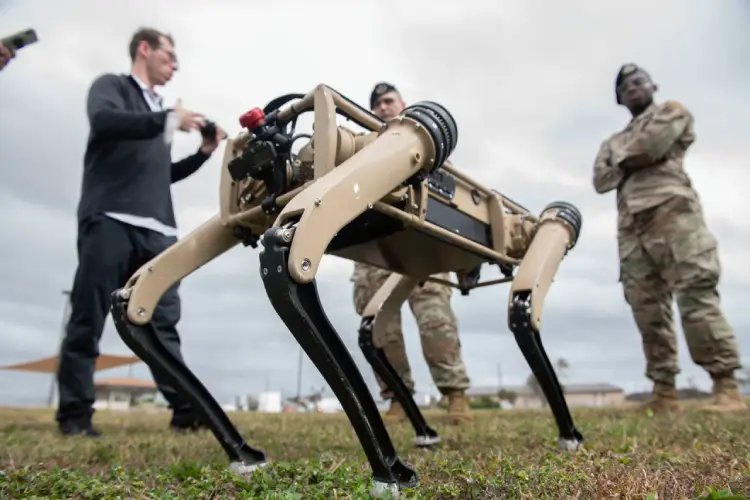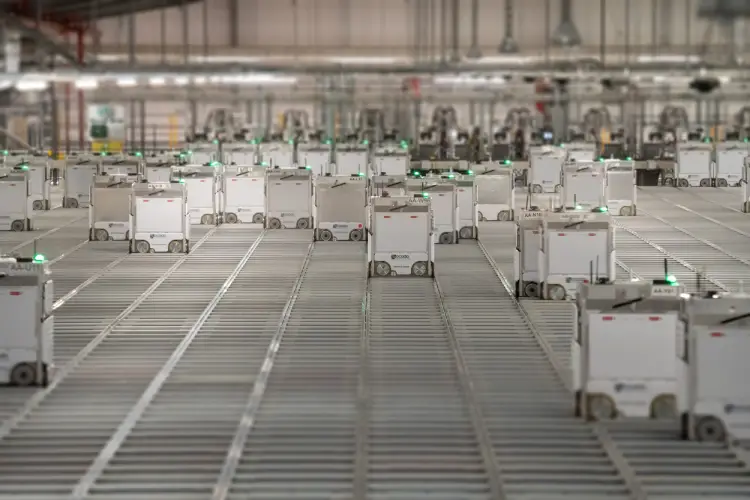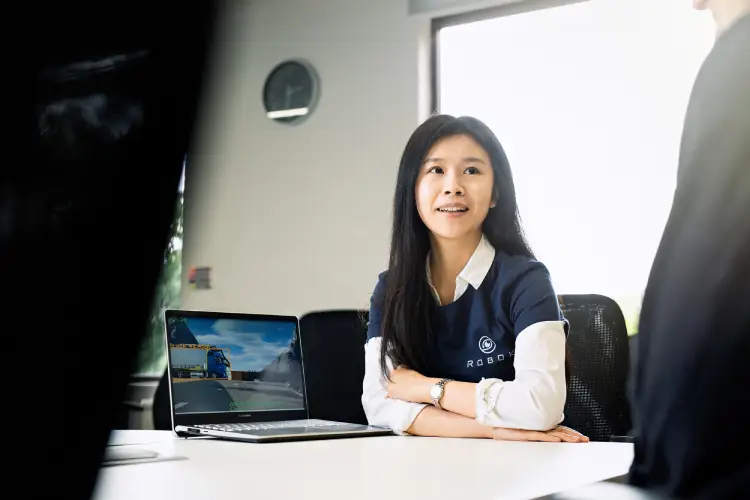
As robots in the world around us become more sophisticated, relationships between people and autonomous systems are growing in importance. Now a new £3m UK government-backed research project is investigating just how important that is – and how to help build trust between humans and machines.
The Covid-19 pandemic has accelerated the deployment of robots, with a record number now operating in industrial settings around the world. This week the US Airforce announced semi-autonomous ‘robot dogs’ are carrying out security patrols at Tyndall Air Force Base in Florida, and in Japan a robot is ensuring customers in a shop wear facemasks and observe social distancing.

With these machines now operating in relatively uncontrolled environments, rather than sitting static in a factory or a lab, ensuring humans feel comfortable with them will be key to further adoption.
“The reason we need to talk about trust now is because we’re basing these new robots on artificial intelligence and deep neural networks,” says Elisa Roth a doctoral researcher in the cyber-human lab at the University of Cambridge engineering department.
“Their algorithms have layers which we can’t explain, so the machine might do something and we won’t know why. So you have to be able to trust them.
“The other thing which makes robots special is the physical component, which means they can actually harm people, unlike other AI decision-making systems that just run on a computer.”
Building trustworthy autonomous systems
The new research project, the Trustworthy Autonomous Systems (TAS) programme will take a close look at how humans and autonomous systems interact, and explore solutions to manage trust in autonomous systems.
Funded by UK Research and Innovation, it will cover scenarios that require interaction with humans such as self-driving cars, autonomous wheelchairs or ‘cobots’ in the workforce.
“Robots tend to be built for specific tasks, and if people over-trust them and try to get them to do things outside their scope, trust and confidence falls away, and they don’t get used effectively,” says Professor Helen Hastie, from Heriot-Watt University and the Edinburgh Centre of Robotics, who is leading the TAS trust node.
“If people don’t trust robots enough for whatever reason, then they won’t get adopted and be able to do the key tasks they could perform such as keeping humans out of harm’s way.”
Prof Hastie and her team, along with colleagues from Imperial College London and the University of Manchester, plan to build on theories about how humans trust and apply those to the field of robotics.
She says: “As robots are able to do more it is important not to distrust them in new scenarios, new situations and with new users. That is why transparency is really important so that users understand clearly what the robots can and can’t do.”
Cobots and automated warehouses
The global automation market, including robots and other autonomous systems such as drones and artificial intelligence, was worth $186bn in 2019, and is expected to grow to $214.3bn in 2021.
Companies contributing to this growth include Tharsus, an OEM developing robotic systems, which the company refers to as ‘strategic machines’, for clients including Ocado, with which it worked on the online grocery company’s automated warehouse, The Hive, which is staffed by a swarm of robots.

Brian Palmer, Tharsus CEO, is expecting demand to accelerate in the near future, and says: “We’re on the cusp at the moment, and in three to five years’ time the landscape will look very different.
“Things like cobots haven’t really landed yet. There are a few operating but they’re only working with small payloads in order to keep them safe.”
For the uninitiated, a cobot is a machine that shares a working environment with humans. At the moment these tend to take the form of staff working alongside the robot on separate tasks, but could in future involve closer collaboration.

Palmer continues: “If you go into a car factory, the robots are still where they were when I started 30 years ago – in cages in the body shop or the paint shop.
“With AI we’re going to see robots that can work alongside people and react when [workers] do something unexpected. That situational awareness will be important [for building trust].”
The Tharsus CEO believes staff will be more open to trusting robots which can contribute to new processes within organisations, rather than replicating existing tasks.
“Will people accept robots? Possibly not if all that they’re doing is what a person previously did for them, because the robot probably won’t do it as well,” he says.
“But as an enabler of a new service proposition, providing something that couldn’t be done by a person in a system of work that makes sense, I think we can have huge success.
“Ocado is a great example of a company that has built an entire new system of work, from the app where people place their orders, right through to the device used by drivers for routing and deliveries. The robots are integral to that.”
Indeed, Walmart recently announced it was scrapping plans for robot shelf scanners to keep track of inventory after a six-month trial revealed humans could do the job more effectively.
Driving up trust in autonomous vehicles
Autonomous vehicles are likely to present a new service proposition for mobility, but will rely on a high degree of trust from passengers to enable the AI to take the wheel.
RoboK is a UK startup developing 3D sensing and perception software for advanced vehicles, as well as machines in industrial settings.

CEO Hao Zheng says safety and comfort concerns will need to be considered to build trust between humans and driverless cars.
“The car need will need to plan and navigate routes whilst avoiding collisions consistently in all scenarios and also provide comfort for passengers,” she says.
“Will a passenger find a robot-taxi trustworthy when constant sudden and sharp brakes are applied on a ride? Potential collisions would have been avoided but the uncomfortable experience will undoubtedly put trust at risk.”
RoboK says its software is optimised for low-power environments and can deliver highly accurate localisation, navigation and perception services. Founded in 2017, it recently announced a partnership with Siemens Digital Industries Software which will see it create a virtual environment for testing new autonomous driving systems.
Beyond the technical side of things, Zheng says the way machines communicate with their users will be vital to building trust.
She says: “A vehicle must be able to choose the right way to communicate and interact with humans. Is it via audio warning, a lane departure warning or blindspot detection, or an evasive manoeuvre such as an automatic lane change?”
Trust in robots: how does it affect digital transformation?
While robot dogs and self-driving cars are not the reality in every business, trust in autonomous systems can be an issue to consider for any company undergoing rapid digital transformation.

Roth, an industrial engineer by background and a former engineering consultant, is researching ways human abilities can be augmented with technology to shape the future of work.
She has worked with companies from a wide range of industries, and says involving staff in the implementation of new systems is a useful way to build trust, adding: “Robots need to be integrated with the other things people use, such as manufacturing execution systems or ERP systems. If they’re not, and it’s a pain for them to use and there are no intersections, people will say ‘what’s the point’?”
While hurdles remain for those developing the next generation of autonomous systems, Tharsus CEO Palmer believes humans will adapt and learn to trust the robots around us.
“A lot of companies believe they need to automate and that they can automate,” he says.
“If you look at these market behaviours, businesses are clearly betting on the fact we will come to trust robots. And I think it’s like everything else; people adapt and accommodate as things change.”






